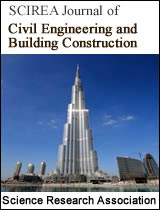The Multidisciplinary Approach to Architectural Education: Bridging the Gap between Academic Education and the Complexities of Professional Practice
DOI: 213 Downloads 13049 Views
Author(s)
Abstract
Many schools of architecture focus on developing students' competence in the spatial and aesthetic aspects of architectural design, with less effort to inform them about the multidisciplinary nature of actual design in practice. The paper will describe the main disciplines that are often involved in the design and construction of actual projects, and will highlight the importance of informing architectural students about the complexities of design in practice. It is noteworthy that several activities take place even prior to commencing the design process. These are referred to as pre-design activities and include preparation of a building's program, economic feasibility, site selection, surveying, and geophysical investigation, which all involve experts and specialized inputs. However, the paper will focus on addressing the processes involved in design and construction. The main activities and disciplines involved in design and construction Phases Disciplines and entities Involved Preliminary design Civil engineering Design development Landscape architecturePreparation of Construction Documents Structural engineering Administration of Construction Contract Mechanical engineering Electrical engineering Plumbing engineering Specification of materials and Equipment Cost estimation Material, equipment, and building ContractorsAll the disciplines and entities listed above are commonly involved in each phase of the development and realization of a building project. In addition, certain assignments such as hospitals, libraries, auditoria, and restaurants, predicate the involvement of special consultants. It is not suggested that architectural students would be groomed to perform any particular function or professional service other than architectural design. The architect though leads and synthesizes the work of all those involved in the process of realizing a building project, and needs to be able to converse intelligently and interact professionally with all those who are involved in the process.
Keywords
ARCHITECTURE, EDUCATION, ENGINEERING, BRIDGING, CONSTRUCTION
Cite this paper
Shafik I Rifaat,
The Multidisciplinary Approach to Architectural Education: Bridging the Gap between Academic Education and the Complexities of Professional Practice
, SCIREA Journal of Civil Engineering and Building Construction .
Volume 5, Issue 1, February 2020 | PP. 1-22.
References
| [ 1 ] | National Council of Architectural Registration Boards (NCARB), "The Architectural Experience Program" (AXP), June 29, 2016. |
| [ 2 ] | American Institute of Architects (AIA), "AIA G601 1994 Request for Proposal-Land Survey" |
| [ 3 ] | American Institute of Architects, "AIA G602-1993 Request for Proposal-Geotechnical Services" |
| [ 4 ] | United States Environmental Protection Agency, "Construction Sector (NAICS 23)", Laws and Regulations covering "Air, General, Lead, Waste, Water". |
| [ 5 ] | American Institute of Architects, "Contract documents", "B-Series: Owner/Architect Agreements" |
| [ 6 ] | American Institute of Architects, "Contract documents", "C-Series: Other Agreements", "C 401-2007": "Standard Form of Agreement Between Architect and Consultant". |
| [ 7 ] | American Institute of Architects, "Contract documents", "A-Series: Owner/ Contractor Agreements" |
| [ 8 ] | International Code Council (ICC), "International Building Code, 2012 IBC", and amendments by local County Authorities. |
| [ 9 ] | US Department of Justice, "2010 ADA Standards for Accessible Design", September 15, 2010. |
| [ 10 ] | University of Houston, Division of Research, Ezekiel W. Cullen, 4302 University Drive, Room316, Houston, TX 77204-2015. |
| [ 11 ] | P. B. Oliver FAIA, and S. I. Rifaat FAIA FAICP, "The Impact of the University of Houston, The Development of the Houston Metropolis, A Case Study", UBA, FADU, Buenos Aires Ciudad "From Knowledge to Development", P 214-230. |
| [ 12 ] | Centre of Sustainability and Resilience (CeSAR0 Professor Bruce Race FAIA, FAICP, Director, Gerald D, Hines College of Architecture, University of Houston. |
| [ 13 ] | The annual Urban Land Institute/Gerald D. Hines Student Urban Design Competition, 1025 Thomas Jefferson St. NW, Washington, D.C. 20007 |
| [ 14 ] | La Biennale di Venezia, International Architecture Exhibition, Venice, Giardini-Arsenale. |
| [ 15 ] | Gerald D. Hines College of Architecture and Design, Materials Research Collaborative (MRC), Donna Kacmar FAIA, Assistant Professor, University of Houston. |

